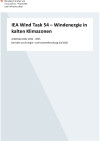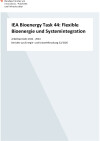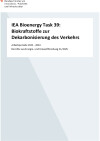Suchergebnisse
IEA Wind Task 54 – Windenergie in kalten Klimazonen (Arbeitsperiode 2022 - 2025)

Zur Erreichung der Ausbauziele für erneuerbare Energien werden Erzeugungsanlagen zukünftig vermehrt an Standorten mit anspruchsvolleren Rahmenbedingungen errichtet werden müssen. Für die Windenergie bedeutet dies in vielen Staaten die Planung und den Betrieb von Anlagen unter Vereisungsbedingungen. Der Task untersucht und bewertet technologische Lösungen in diesem Umfeld und veröffentlicht Verfahrensempfehlungen in Form von technischen Berichten und Richtlinien.
Schriftenreihe
63/2025
Andreas Krenn, Claas Rittinghaus, Alexander Stökl
Herausgeber: BMIMI
Deutsch, 47 Seiten
Downloads zur Publikation
IEA Wind Task 54: Performance Envelopes von Rotorblattheizungssystemen (2025)

Untersuchung des Performance Envelopes von Rotorblattheizungssystemen, um zukünftig die Systeme in den einzelnen Projektentwicklungsphasen und im Betrieb besser bewerten und vergleichen zu können.
Claas Rittinghaus, Florian Pfannhofer
Herausgeber: Energiewerkstatt Verein, 2025
Deutsch, 26 Seiten
Downloads zur Publikation
IEA Bioenergy Task 44: Flexible bioenergy policies in different countries – Summary report (2025)

In diesem Bericht werden die Ergebnisse aus zwei Untersuchungen über die politischen Rahmenbedingungen im Bereich der flexiblen Bioenergie aus 14 Ländern und der Europäischen Union zusammengefasst.
Daniela Thrän, Nora Lange, Elina Mäki, Heidi Saastamoinen, Thomas Schleker, Miia Nevander
Herausgeber: IEA Bioenergy Task 44. 2025
Englisch, 6 Seiten
Downloads zur Publikation
IEA SHC Task 72: "Accelerating solar fuel discovery guided by AI-driven autonomous lab". Interview mit Chair Víctor de la Peña O’Shea (2025)

Das Netzwerk des IEA SHC Task 72 widmet sich solaren Photoreaktoren für die Erzeugung von Brennstoffen und Chemikalien. Im Interview mit Bärbel Epp gibt Víctor de la Peña O’Shea von IMDEA Energy Einblicke in aktuelle Arbeiten.
Bärbel Epp im Interview mit Víctor de la Peña O’Shea
Herausgeber: solarthermalworld.org, 2025
Englisch
IEA Bioenergy Annual Report 2024

Der Jahresbericht enthält einen Bericht des Exekutivkomittees sowie detaillierte Fortschrittsberichte aller laufenden Tasks.
Herausgeber: IEA Bioenergy (2024)
Englisch, 110 Seiten
Downloads zur Publikation
IEA Bioenergy Task 44: Technologien für flexible Bioenergie – Update 2025

Der Bericht zeigt, wie nachhaltige Bioenergie zur Flexibilisierung von Energiesystemen beiträgt – zeitlich, räumlich, sektoral sowie hinsichtlich Rohstoffen und Produkten.
Herausgeber: IEA Bioenergy Task 44, 2025
Englisch, 88 Seiten
Downloads zur Publikation
IEA Bioenergy Task 39: Lowering Hinders for Maritime Biofuels – Identifying means to increase the use of biofuels in the marine sector (2025)

Die Hauptfragestellungen waren: Wie kann die Industrie die Verwendung von Biokraftstoffen für den Seeverkehr ausweiten? Welches sind die aktuellen Trends der Push- und Pull-Mechanismen auf dem Markt? Welches sind die Haupthindernisse für den Einsatz von Biokraftstoffen im Seeverkehr? Was ist erforderlich, um das Potenzial zu nutzen?
David Bauner et al.
Herausgeber: IEA Bioenergy Task 39, 2025
Englisch, 127 Seiten
Downloads zur Publikation
IEA Bioenergy Tasks 33, 36, 39, 44: Fallstudien zur Wasserstoffproduktion aus Biomasse (2025)

Der Bericht analysiert Technologien zur Erzeugung von Wasserstoff aus Biomasse und bewertet deren Reifegrad, Wirtschaftlichkeit und Klimawirkung anhand von Fallstudien.
Joakim Lundgren et al.
Herausgeber: IEA Bioenergy, 2025
Englisch, 49 Seiten
Downloads zur Publikation
IEA Bioenergy Task 44: Technologies for Flexible Bioenergy (2025)

Der Bericht hebt hervor, wie flexible Bioenergie-Technologien, die sowohl kurzfristige als auch langfristige Flexibilität bieten, zur Stabilisierung des Stromnetzes, zur Unterstützung von Wärmesystemen und zur Bereitstellung von Energiespeichern und Transportlösungen beitragen, wobei ihre volle Flexibilität noch nicht vollständig ausgeschöpft wird, insbesondere aufgrund von Markt- und Subventionssystemen, die oft auf eine konstante Betriebsweise ausgerichtet sind.
Tilman Schildhauer, Pieter Kroon, Jaap Kiel, Ernst Höftberger, Markus Gölles, Emanuele Moioli, Hossein Madi, Gabriel Reichert, Florian Kupelwieser
Herausgeber: IEA Bioenergy Task 44, 2025
Englisch, 93 Seiten
Downloads zur Publikation
IEA Bioenergy Task 44: The Value of Flexible Bioenergy - An empirical assessment of the electricity markets in selected European Countries (2025)

Bioenergie ist eine wichtige Flexibilitätsoption im Elektrizitätssystem, die zur Dekarbonisierung beiträgt und intermittierende erneuerbare Energien wie Wind- und Solarenergie ausgleicht, wobei flexible Betriebsmodelle den Marktwert und die Auswirkungen auf die Strompreise und Treibhausgasemissionen in verschiedenen europäischen Ländern beeinflussen.
Martin Dotzauer, Daniela Thrän
Herausgeber: IEA Bioenergy Task 44, 2025
Englisch, 28 Seiten
Downloads zur Publikation
IEA Bioenergy Task 44: Expectations on flexible bioenergy in different countries (2025)

Dieser Bericht über die Erwartungen an flexible Bioenergie in verschiedenen Ländern erscheint als zweiter Teil nach dem bereits veröffentlichten Bericht “Implementation of flexible bioenergy in different countries” (Thrän et al. 2024) und untersucht nationale Ziele für flexible Bioenergie sowie ihre Rolle in der Transformation des Energiesystems.
Daniela Thrän, Nora Lange, Elina Mäki, Heidi Saastamoinen, Thomas Schleker, Miia Nevander
Herausgeber: IEA Bioenergy Task 44. 2025
Englisch, 45 Seiten
Downloads zur Publikation
IEA Photovoltaik Power Systems Snapshot Report 2025

Der IEA Photovoltaik Power Systems Snapshot Report gibt einen Überblick über die aktuellen weltweiten Entwicklungen zu Produktions- und Installationskapazitäten sowie Policy und Marktunterstützungsmaßnahmen.
Herausgeber: IEA PVPS, Task 1, 2025
Englisch, 26 Seiten
IEA Bioenergy Task 39: Newsletter, Ausgabe 67, Juni 2025

Der Schwerpunkt dieser Ausgabe liegt auf dem Country Report aus Brasilien „A Biofuels Success Story Brazil“.
Tomas Ekbom, Glaucia Mendes Souza, Jeanette Fogelmark
Herausgeber: IEA Bioenergy TCP Task 39, 2024
Englisch, 23 Seiten
Downloads zur Publikation
IEA SHC Solar Heat Worldwide, Edition 2025: Marktbericht über Solarwärmetechnologien

Solar Heat Worldwide 2025 bietet mit Daten aus 73 Ländern eine umfassende Darstellung der solaren Wärme- und Kühlmärkte weltweit. Die globale Marktentwicklung 2024 in Hinblick auf Anlagen für solare Warmwasserbereitung, für Anwendungen im Gebäudebereich sowie für solare Nah- und Fernwärmenetze und solare Prozesswärmeanlagen sind ebenso enthalten wie ein Ausblick auf Entwicklungen im Jahr 2025. Für das Jahr 2023 präsentiert der Bericht detaillierte Marktdaten.
Herausgeber: IEA Solar Heating & Cooling Programme, Juni 2025
Englisch, 95 Seiten
IEA Bioenergy Task 44: Flexible Bioenergie und Systemintegration (Arbeitsperiode 2022 - 2024)

IEA Bioenergy Task 44 trägt zur Entwicklung und Analyse von flexiblen Bioenergielösungen als Beitrag zu einem kohlenstoffarmen Energiesystem bei. Ziel war es, das Verständnis für die Möglichkeiten und deren Potentiale sowie den Status flexibler Bioenergie zu verbessern und Hindernisse sowie den künftigen Entwicklungsbedarf im Kontext des gesamten Energiesystems (Strom, Wärme und Verkehr) zu ermitteln.
Schriftenreihe
52/2025
Markus Gölles, Carina Deutsch, Thomas Reiter-Nigitz, Fabian Schipfer
Herausgeber: BMIMI
Deutsch, 46 Seiten
Downloads zur Publikation
IEA Bioenergy Task 44: Annual Report 2023

Jährlich kommen die Tasks von IEA Bioenergy zusammen, um ihre Erfolge in einem Bericht hervorzuheben. Dieses Dokument zeigt die erzielten Fortschritte, die veröffentlichten wertvollen Publikationen und die bedeutende Rolle der Tasks.
Dina Bacovsky
Herausgeber: IEA Bioenergy TCP, 2024
Englisch, 113 Seiten
Downloads zur Publikation
IEA Bioenergy Task 44: Implementation of flexible bioenergy in different countries Status quo of implementation, barriers and policy framework (2024)

Die Neuauflage des Berichts zeigt, dass noch immer die politischen Rahmenbedingungen entscheidend für die Relevanz flexibler Bioenergie, etwa für Strom, Wärme, Biokraftstoffe und CO2-Nutzung sind.
Daniela Thrän, Nora Lange, Elina Mäki, Heidi Saastamoinen, Thomas Schleker
Herausgeber: IEA Bioenergy Task 44. 2024
Englisch, 59 Seiten
Downloads zur Publikation
IEA Bioenergy Task 39: Biokraftstoffe zur Dekarbonisierung des Verkehrs (Arbeitsperiode 2022 - 2024)

Das langjährige Ziel von IEA Bioenergy Task 39 ist das Vorantreiben der Dekarbonisierung im Transportsektor mithilfe von biogenen, nachhaltigen Treibstoffen mit niedriger Kohlenstoffintensität. Dies schließt konventionelle und fortschrittliche Biokraftstoffe ein, die über verschiedene technologische Routen (oleochemische, biochemische, thermochemische und hybride) hergestellt werden können. Im Triennium 2022-2024 lag der Fokus zunehmend auf dem schwieriger zu elektrifizierenden Langstreckenverkehr.
Schriftenreihe
51/2025
Andrea Sonnleitner, Dina Bacovsky
Herausgeber: BMIMI
Deutsch, 46 Seiten
Downloads zur Publikation
IEA Report: Global Hydrogen Review 2025

Der jährlich erscheinende „Global Hydrogen Review” der Internationalen Energieagentur verfolgt die weltweite Wasserstoffproduktion und -nachfrage und beleuchtet die neuesten Entwicklungen in den Bereichen Politik, Infrastruktur, Handel, Investitionen und Innovation.
Herausgeber: IEA, 2025
Englisch
IEA PVPS Task 1: National Survey Report of PV Power Applications in Austria 2024

Überblick über die aktuellen Entwicklungen bei Markt, Produktion und Rahmenbedingungen im Jahr 2024 in Österreich
Herausgeber: IEA PVPS, Task 1, 2025
Englisch, 30 Seiten
